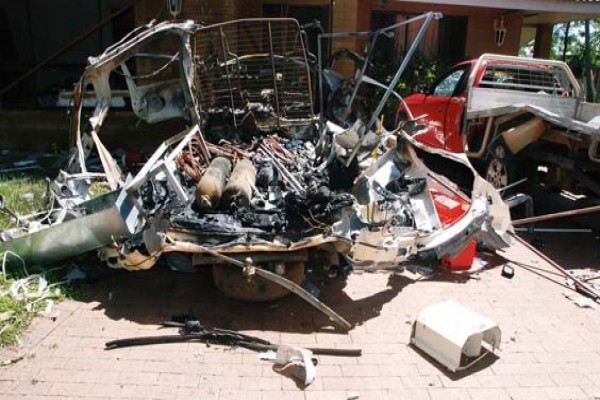Rather be safe than sorry, check gas bottles
Exploding plumbing vans are unfortunately more common than some would think. Casey McGuire looks at why it happens as well as ways to detect and prevent gas leaks.
January 2025 is the most recent documented explosion of an air conditioner repair man’s van in Nunawading, Victoria. The power of the blast left only the shell of a van remaining as debris travelled up to four houses away. The intensity of the shockwaves shattered nearby windows, concaved garage doors and took chunks out of surrounding cars.
The most recent example before that was in 2009, where a plumber was fined $25,000 after his gas canisters exploded in his van in Melbourne’s south east. He was found guilty of breaching two workplace safety laws as several houses were damaged by the explosion and an apprentice severely hurt.
It’s suspected that these explosions were caused by acetylene gas, a colourless and flammable gas used by plumbers for welding and cutting because of its high heat when combined with oxygen. While it does its job, it can present several safety issues when not dealt with accordingly.
A WorkSafe investigation following the 2009 incident found that the acetylene gas explosion was triggered by the vehicle’s central-locking remote control.
Unfortunately, this isn’t new. In one of Plumbing Connection’s earliest editions, in 1987, a plumber accidentally triggered a van explosion by lighting a cigarette. He was lucky to escape with his life after gas had been leaking out in his van all night.
Shouldn’t he have smelt the gas in the van? As a plumber, he was always familiar with the faint smell of gas coming from the back of his van and didn’t suspect much.
“With the bottles in the back all the time you are always aware of the presence of a certain amount of gas,” survivor Gus Anderson told Plumbing Connection in 1987.
“In this case, it has escaped and stayed mostly in the rear of the van, so I was not aware of anything particularly unusual.”
The explosion started at the front of the van and blew backwards. That’s what saved Gus and if it was the other way around, he wouldn’t have been so lucky.
“One thing it has done is to make me think a lot deeper about safety on the job, I have always had a happy-go-lucky attitude and like everyone else, assumed it would never happen to me,” he says.
“The day after my accident, the boys at work checked the bottles in the other vehicles and sure enough, we found another one with a leak.”
It was, again, an acetylene bottle that exploded. But there are several other ways for a life to potentially be taken in a flash of orange light.
“Methylacetylene-propadiene (MAPP) gas is liquified and is heavier than air so it sits,” Master Plumbers NSW chief executive Nathaniel Smith says.
“If you have a gas bottle in the van and someone hasn’t turned it off properly or it’s leaking, it’ll just sit in the van and all it requires is the right air-gas ratio and an ignition source. That can be a cigarette, it could be a light, it could be a mobile phone that can trigger it and blow you to kingdom come.”
A van is essentially a small cabin in this instance, and if no air is getting into it, it only takes a slight change to the air gas ratios of 25:1 for LPG, 31:1 for butane gas and 1:96 for acetylene to create an explosion if it has an ignition source.
There can be times when there is too much gas and not enough oxygen, so it wouldn’t create an explosion. In this instance, open all the doors and run for the hills. There could also be a situation where there is too much gas and no oxygen, so it can’t explode.
“It shows why a lot of people are now using utes and having their gas bottles chained to the back. Some of the vans do have ventilation, like a little whirly burly in the roof to let any air out, but it can be quite dangerous,” Nathaniel says.
While most plumbers have made the switch to utes, cutting down on the risk of an ignition, several security concerns arise with an open-air tray over a van.
The Gas Legislation Amendment (Medical Gas Systems) Act 2020 went through the NSW parliament and Nathaniel, member of parliament at the time, told the story about a man in North Ryde, when Nathaniel was an apprentice plumber. The gas bottle was leaking all night in the plumber’s van, the next morning he got into the van and lit a cigarette. Then boom. He was dead.
For plumbers who want to avoid these incidents, there are two ways of detecting a gas leak:
- Hover a gas detector over the piping and it will expose where the leak is within the piping or
- Spray soapy water on the compression joints.
“The way to see if there’s a leak is by spraying soapy water on the compression joints, if it’s connected up to a torch or if it’s not connected to anything, when you spray soapy water on a gas joint, if there’s a leak it will start blowing bubbles,” Nathaniel says.
Gus says he knows it’s a pain but “the next bloke won’t be as lucky”. Gus has been telling people to be careful in the 80s, and Nathaniel is still telling people to be careful in 2025.
People might think that it won’t happen to them, but surprise, this happens and more often than people think. It’s critical that plumbers constantly check their equipment and fix any gas leaks that arise immediately.
“People don’t realise how dangerous liquefied gas cylinders and acetylene bottles are,” Nathaniel says.
“The chance is small, but if there’s a leak and the right air-to-gas ratio, the outcome could be disastrous.”

